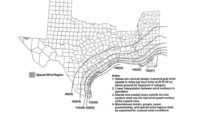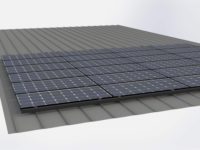S-5!, the leading authority on metal roof attachment technology, introduces the newest addition to its line of WindClamps, designed to increase wind resistance for standing seam and other concealed-fastened metal roofs.
The new WindClamp2X, as with all S-5!’s WindClamps™, are small aluminum clamps placed over the roof’s seam at designated intervals to prevent male-to-female seam separation and/or seam separation from the roof’s mounting clip. S-5! WindClamps are a cost-compelling alternative for new construction and can also be used in retrofit applications to bring older roofs into compliance with current codes and wind standards.
Attaching these simple, yet highly-tested clamps to a roof’s seams have proven to dramatically improve wind uplift performance for more than 25 years. S-5! WindClamps increase – and often double – wind resistance, preventing multiple modes of failure, including seam separation and clip disengagement when used at roof clip locations. This clamp-to-seam technology has been a highly cost-effective solution to preserve rooftops in some geographic regions and/or roof “zones” with increased probability of extreme wind uplift conditions.
S-5! Now offers three WindClamp solutions for a variety of roof profiles:
· WindClamp DL, designed for MBCI Double-Lok and licensees
· WindClamp UD, designed for MBCI Ultra-Dek and licensees
· NEW WindClamp2X, designed for other specific double-folded standing seams, i.e., Butler MR-24 and Varco Pruden SSR
“The magic is not in a generic ‘seam clamp,’ or in a seam clamp that ‘fits okay’ or ‘fits’ multiple seam profiles,” says S-5! CEO & Founder, Rob Haddock who has served on ASTM committees for wind testing and standardization. “The magic is in knowing how to design a seam clamp for this purpose and for a specific panel profile. S-5! WindClamps can increase strength by 100, 200 or even 300% with test protocols to prove it. We understand how to design these clamps because our team has the in-depth knowledge and experience of how the total roof assembly responds to wind uplift.”



